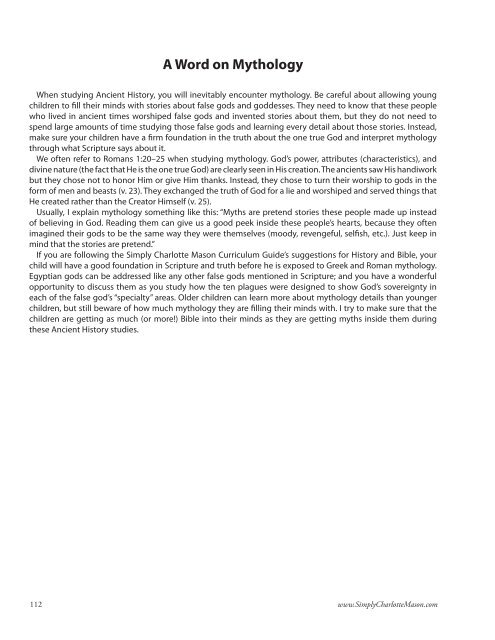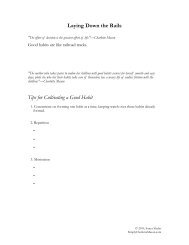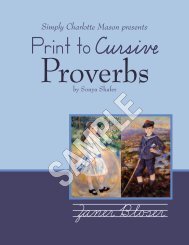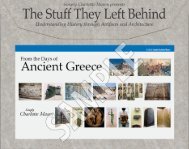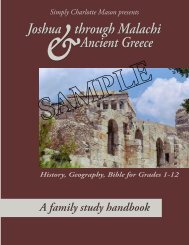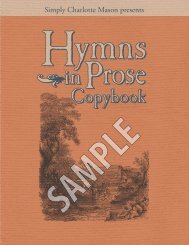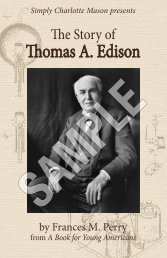Genesis through Deuteronomy & Ancient Egypt sample - Simply ...
Genesis through Deuteronomy & Ancient Egypt sample - Simply ...
Genesis through Deuteronomy & Ancient Egypt sample - Simply ...
- No tags were found...
Create successful ePaper yourself
Turn your PDF publications into a flip-book with our unique Google optimized e-Paper software.
A Word on MythologyWhen studying <strong>Ancient</strong> History, you will inevitably encounter mythology. Be careful about allowing youngchildren to fill their minds with stories about false gods and goddesses. They need to know that these peoplewho lived in ancient times worshiped false gods and invented stories about them, but they do not need tospend large amounts of time studying those false gods and learning every detail about those stories. Instead,make sure your children have a firm foundation in the truth about the one true God and interpret mythology<strong>through</strong> what Scripture says about it.We often refer to Romans 1:20–25 when studying mythology. God’s power, attributes (characteristics), anddivine nature (the fact that He is the one true God) are clearly seen in His creation. The ancients saw His handiworkbut they chose not to honor Him or give Him thanks. Instead, they chose to turn their worship to gods in theform of men and beasts (v. 23). They exchanged the truth of God for a lie and worshiped and served things thatHe created rather than the Creator Himself (v. 25).Usually, I explain mythology something like this: “Myths are pretend stories these people made up insteadof believing in God. Reading them can give us a good peek inside these people’s hearts, because they oftenimagined their gods to be the same way they were themselves (moody, revengeful, selfish, etc.). Just keep inmind that the stories are pretend.”If you are following the <strong>Simply</strong> Charlotte Mason Curriculum Guide’s suggestions for History and Bible, yourchild will have a good foundation in Scripture and truth before he is exposed to Greek and Roman mythology.<strong>Egypt</strong>ian gods can be addressed like any other false gods mentioned in Scripture; and you have a wonderfulopportunity to discuss them as you study how the ten plagues were designed to show God’s sovereignty ineach of the false god’s “specialty” areas. Older children can learn more about mythology details than youngerchildren, but still beware of how much mythology they are filling their minds with. I try to make sure that thechildren are getting as much (or more!) Bible into their minds as they are getting myths inside them duringthese <strong>Ancient</strong> History studies.112 www.<strong>Simply</strong>CharlotteMason.com


